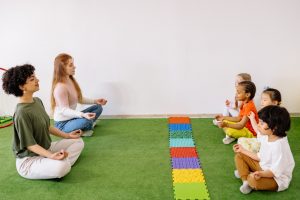The principles of Montessori education are not the same as the principles of other types of educational methodologies. In this article, we will look at what is unique about Montessori education, and why it is so different from the types of schooling that exist today. In essence, the principles of Montessori education are more about knowing how kids learn, rather than defining what exactly Montessori education is. When you read this article, it may make you think that it can’t be possible for any of the educational systems that are currently available to the general public to implement the ideals of Montessori education.
Create a positive learning environment
The most important ideals of Montessori education are the basic human right of every child to be nurtured in a positive learning environment and to have individual freedom and responsibility. A Montessori teacher is considered to be the head of the learning environment, and any student who attends classes under their supervision is considered a student. This freedom and responsibility that students have as individuals are often at odds with the other pressures that we have in our modern-day educational system. However, for many students, the very fact that there is an educational system at all means that they have a right to be treated as individuals.

Allow children to become self-sensitive
A key principle of Montessori education is the importance of allowing children to become self-sensitive. In Montessori education, the teacher’s goal is to ensure that young children learn best by becoming self-sensitive to their needs and wants. Most of the time, this involves a certain amount of sensitivity on the part of the teacher to the needs and desires of the students. Once children have a sense of self-sensitivity, this enables them to feel that they can actively learn about things, without the intervention of other people. This also prevents the young teacher from reacting to the child’s needs in an insensitive way.
Maintain a continual and flexible approach to the curriculum
Another key principle of Montessori education is the importance of maintaining a continual and flexible approach to the curriculum. Since most students are given some leeway in deciding what they want the class to focus on, the teacher does not need to impose any set curriculum on the class. Instead, the teacher’s role is to let the students determine what they want the classroom to be like. This freedom of choice is very important to the Montessori teacher. It allows the teacher to effectively engage with the students and help them to navigate the curriculum. Constant flux is a hallmark of the Montessori classroom, which ensures that students are always open and flexible.
Use feedback
One of the most important principles of Montessori education is to use immediate feedback. In a Montessori classroom, teachers receive immediate feedback on their teaching techniques. This is not a form of criticism, but rather a positive reinforcement that helps teachers to continue to make improvements. The beauty of this style of learning lies in the fact that there are no set techniques, goals, or schedules by which teachers must adhere. Everything is fluid, which makes the learning experience highly enjoyable for students and also allows teachers to continually work to improve themselves as educators.

Use direct instructions
The third fundamental of Montessori education is the use of direct instruction and the ability to make learning happen. Learning can only happen when there is a desire within the student to learn. When the Montessori curriculum is used, all materials are used as a means to an end, and not as a means to achieve some goal. Instead, the teacher encourages the students to use the materials that are at hand in the classroom for instructional purposes. The idea is to create a classroom environment that is full of curiosity and open-mindedness. Here, students are constantly engaged and interested in the process of learning.
Teach students to be active
The fourth fundamental of Montessori education is the use of an absorbent mind. Students must be taught to take an active interest in the materials that they are studying. By taking an interest, students can retain the information that they have absorbed. This allows them to apply what they have learned in the classroom in real-life situations. This does not mean that teachers give away all of their material in the classroom. Rather it means that that the student must be actively engaged in learning the material.
To sum up
All of the Montessori principles listed above have important qualities that provide students with a comfortable learning environment. These are not principles that can be taught only once, or even only once. As many schools have discovered, the best way to ensure success is to incorporate these principles throughout the curriculum from the very beginning. Once the Montessori educational philosophy is firmly in place, it provides parents and educators with the knowledge. Also, it gives tools that are necessary to ensure that all students receive a quality education. There are many resources available to teach principles of Montessori education. The most important is to ensure that all students get a chance to learn these important principles.



